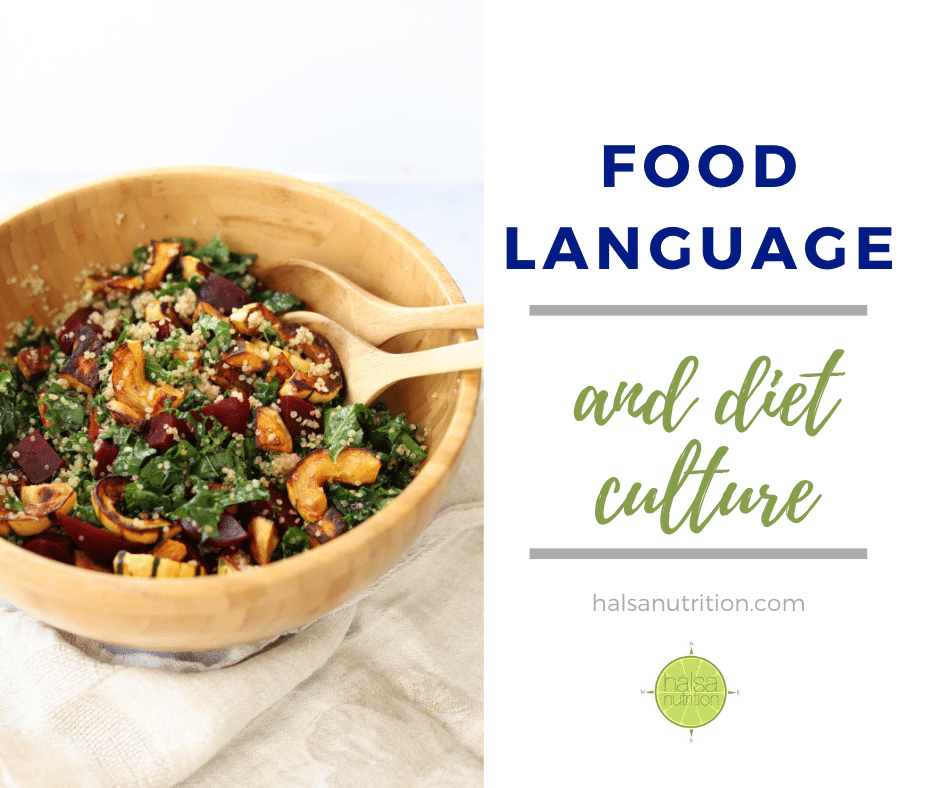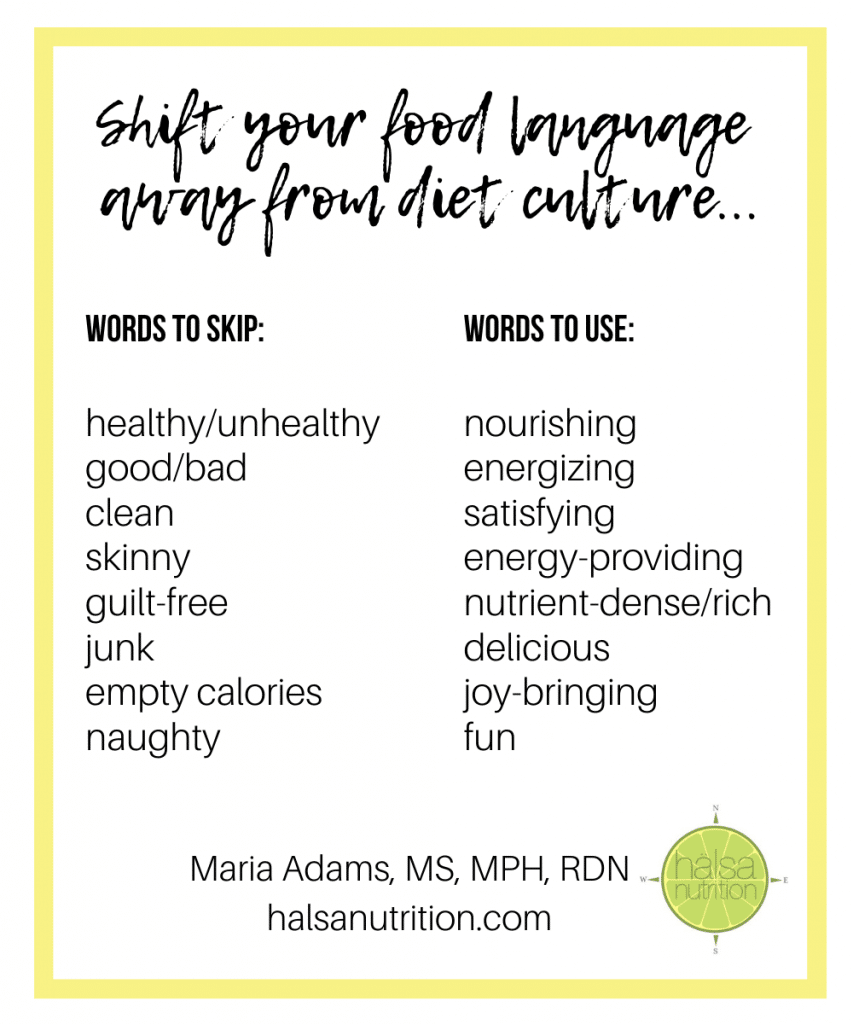
Diet Culture and Food Language
Working on getting out of the diet mentality and shifting your family away from diet culture? What you say matters.

When I first became a dietitian I frequently threw around the words “healthy” and “unhealthy”. While I was a proponent of “all foods can fit”, in my mind, some foods were good and others bad.
Fortunately, since then my thinking has evolved. My first shift occurred in graduate school at Tufts, when I was taught that it’s not even technically correct to call food “healthy”. “People can be healthy,” one of my writing instructors said, but food, on the other hand, should be referred to as “healthful.”
My second major shift occurred in the past five years when I started reading up on intuitive eating and the negative effects of diet culture.
Fast forward to 2020, and it is still commonplace to refer to food as being healthy/good or unhealthy/bad as well as other terms described below. However, I’m hopeful that the current focus on intuitive eating will move us away from this dichotomous way of thinking.
Why shouldn’t we label food as unhealthy or unhealthy?
One problem is that nutrition isn’t as easy as labeling foods into healthy or unhealthy categories. There is a lot more gray. Nutrition and health are about more than what you eat at any one given time.
Likewise, food has no moral value. One is not “bad” for eating a certain food or “good” for eating another. Thinking this way results in increased stress and anxiety around food, which is definitely not promoting overall health and nutrition.
Sure, certain foods have more nutrients in them than others, but that doesn’t mean we should only eat those foods or feel bad when we choose less nutrient-dense foods. This kind of thinking can increase the risk of disordered eating and eating disorders.
Food, and the tradition of eating with others, is about so much more than what is on your plate. Yes, food is energy and nourishment, but it is also love, culture, tradition, joy, satisfaction, and comfort.
Yes, food is energy and nourishment, but it is also love, culture, tradition, joy, satisfaction, and comfort.

Other Diet Culture Terms
In addition to labeling food as good/bad or healthy/unhealthy, other terms that we hear thrown around but can be harmful include:
“Clean eating.” This is a sneaky diet culture term that is associated with eating only organic, sustainable, and unprocessed food. Sometimes it also entails eating vegan or gluten-free. It’s focused on diet purity and suggests that to be pure and wholesome you must eat this way.
This way of demonizing certain foods and suggesting that we need to eat clean and perhaps even detox is not accurate and is more harmful than healthful. It also promotes orthorexia, a condition in which people become obsessed with how “clean” or “healthy” their food is.
Sure, it’s good to eat whole foods and it’s great to choose organic and sustainable foods if you can, but this is not realistic or attainable for most, nor is it necessary. (Also, just because something is processed doesn’t mean it’s not nutritious. Canned beans, yogurt, peanut butter, frozen veggies, and whole-grain bread are all processed.)
“Skinny ______” I see this most commonly with recipes, but I wish it would go away. Calling a recipe “Skinny Brownies” or “Skinny Alfredo Sauce” is very diet culture and suggests that being skinny should be our goal.
“Guilt-free.” Everything should be eaten without guilt! Unless maybe you stole the food!
“Junk” or “Empty calories.” There is no need for these labels. Sure, some foods are more nutrient-rich than others, but all food has nutritional value. Whether it’s a can of soda that provides quick energy in the form of sugar or a bag of chips that provides a good dose of energy in the form of carbohydrates and fat. Would we want these foods to make up a large part of our diet? Probably not. Do they provide value? Yes! In addition to the caloric energy they probably also provide pleasure. Do they deserve to be enjoyed without guilt because they are “junk” or “empty”? Definitely!

Shift Your Family’s Food Language Away from Diet Culture
Instead of labeling food as good/healthy/clean or bad/unhealthy/junk/naughty, here are some more positive, non-diet descriptors to use when describing food, recipes, or eating:
- Nourishing
- Energizing
- Satisfying
- Energy-providing
- Nutrient-dense/rich
- Delicious
- Joy-bringing
- Fun
You could also use the word nutritious, I just wouldn’t overuse this word or use it to compare one food with another because then it too might become more of a diet word. Of course, you can also skip the descriptors and just eat!
Note that if you find that you often use many of the diet-culture words that I mentioned here, no worries. I am still unlearning diet culture myself and some of my older recipes still have the word “healthy” in their title. It’s an ever-evolving learning and relearning process!
Bottom line: How we refer to food, think about food and write about food matters. Try to keep food talk positive and don’t label foods as good or bad.
Similar Blog Posts:
Help Your Child Establish a Positive Relationship with Food
Leave a Reply